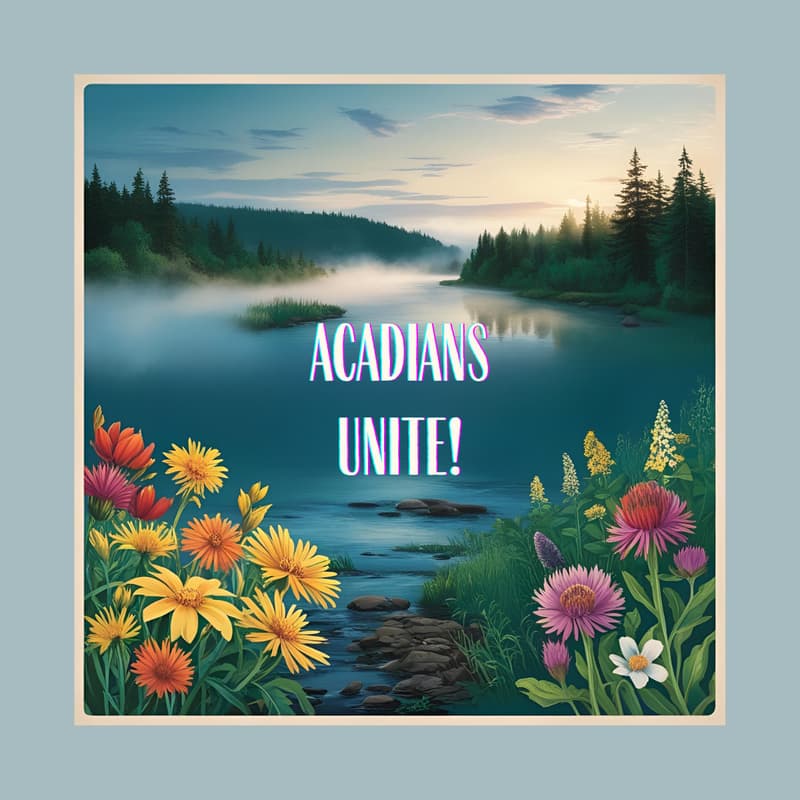Acadians Unite! - Reconnection
Acadians Unite! is a civic and cultural forum for bioregional initiatives, presented by the Shantigar Foundation; featuring community partners, thought leaders, town hall style discussions, community presentations, initiative planning, and networking.
Join us as we kick off our 2025 "YEAR OF KUNI" to develop more creative and resilient rural and urban connections through bioregional mobilizing across America's northeast forests.
Our spring event will explore themes of reconnection and resilience.
Featuring KUNI co-author Richard McCarthy, Wellspring Commons, and Regen Foundation.
KUNI:
The challenges of the 21st century call on us to imagine new ways of living together. In his Book KUNI: A Japanese Vision and Practice for Urban-Rural Reconnection, Richard McCarthy shares the ideas of Tsuyoshi Sekihara, founder of the Kuni movement. Kuni is an approach which brings together ordinary citizens to share their ideas and revive their communities.
Richard McCarthy is an author, speaker, and community development specialist who plays hyper-local and global roles in growing community through food. In 1995, Richard founded the Crescent City Farmers Market in New Orleans and later played a pivotal role in reviving the markets after Hurricane Katrina. He has served as Executive Director for Slow Food USA and President of the US Farmers Market Coalition. Richard is now President for the Rome-based World Farmers Markets Coalition.
INSPIRATION:
McCarthy and Sekihara begin with a Kuni Manifesto, which lays out suggested principles of a kuni community. They include:
o Everyone is equal in a kuni;
o A kuni is self-sufficient;
o A kuni is equipped with a regional management organization (RMO), a democratic organization that takes care of small public services;
o Life in a kuni is circular and forms a beautiful spiral;
o Kuni is a link between residents and repeat visitors;
o Kuni is a place for young people who seek interconnectedness.
"The Northern Appalachian-Acadian-Wabanaki ecoregion encompasses the most intact temperate broadleaf forest remaining in the world, and stands out in eastern North America as a center of climate resilience.
"Despite the global importance of this region, less than 10% is strictly protected as parks and wilderness. Another 25% has some degree of protection, but many areas are subject to intensive management practices that alter natural age patterns and reduce the diversity and ecosystem functions associated with older forests.
"It is vital that we step up the rate and scope of forest conservation in Canada and the U.S. If we maintain and restore the landscape and its many interconnections, it could serve as a lifeboat for natural and human communities in the face of climate change."
“...prioritizing the analyzed climate actions between community and urban scales, where global and local convergences can help catalyze and enhance individual, household and local practices, and support national and international policies and finances for rapid sustainability transformations.”
– Ecologist, Avit K. Bhowmik
“Is Kuni about creation? Exactly.”
–Tsuyosho Sekihara, co-author, KUNI
"The modernist severance of social and ecological life systematically erased many traditions and rites through which the living world is legible to human beings. Traditional ecological knowledge, rituals of common resource management, animism, and disciplines like eco-semiotics demonstrate the wider range of ecological sensitivity humans are capable of in order to act in “right relation” with the living world. We view the ecological institutions as continuation of these kinds of practices at an infrastructural scale.
Legibility between organisms and their environment is a large topic, meriting many further dedicated projects. Within the context of ecological institutions, the focus is on how learning to “read” the environment enables humans to enter more robust regenerative relations. This principle, in effect, plays out now across different media and social technologies."
-Austin Wade Smith, Ecological Institutions
GOALS:
Strengthen rural and urban relationships through a welcoming, playful, collaborative, and informative community.
Provide a forum for open discussion on how to develop healthier bioregional relations through innovative social coordination.
